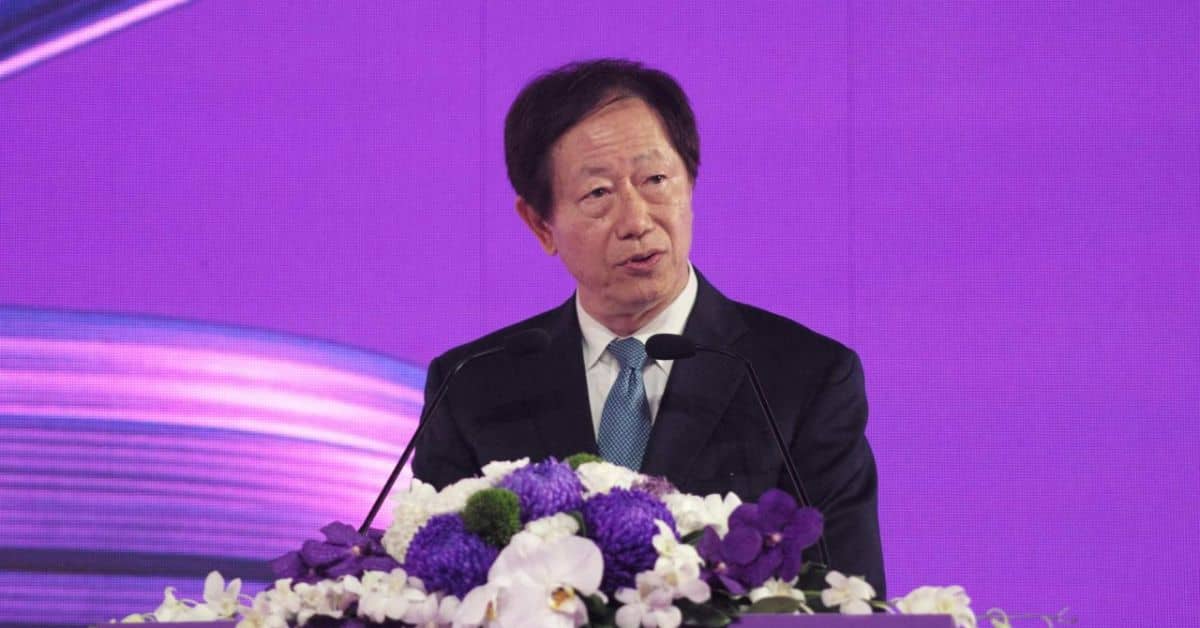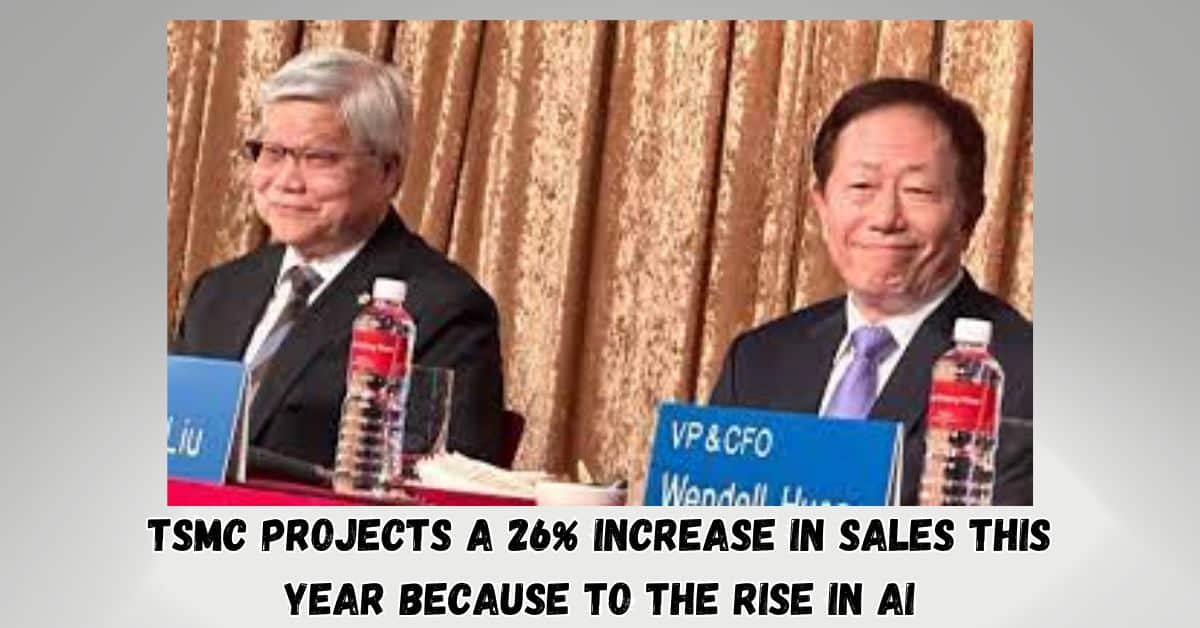On Thursday, the biggest contract chipmaker in the world, Taiwan Semiconductor Manufacturing Co., predicted that its sales might increase by 26 percent this year, thanks to the surge in generative AI computing and the expansion of the worldwide electronics market.
The forecast was made by TSMC CEO C.C. Wei in response to the company’s announcement that its net income for the fourth quarter dropped 19.3% year-on-year to 238.71 billion New Taiwan dollars ($7.48 billion), with revenue remaining relatively unchanged at NT$625.52 billion.
Wei predicted that TSMC’s revenue will rise “quarter after quarter throughout 2024,” with a 21% to 26% increase for the full year as a result of the company’s continuing growth of state-of-the-art production for AI-related chips.
“So far today, everything you saw on the AI [computing chips] is from TSMC,” Wei said. “We already see that momentum … The demand for AI suddenly picked up since March or April last year after the boom of ChatGPT.”
During the following five years, Wei predicted that AI computing’s yearly growth rate might reach 50% and that AI processors may make up 15-20% of its income. Nvidia and Advanced Micro Devices are critical customers for the firm’s artificial intelligence chips.
According to TSMC chairman Mark Liu, the company is re-evaluating the technology it plans to utilize at its second Arizona plant and may delay the commencement of commercial production until 2027 or 2028.
“The second [U.S. plant] shell is under construction, [but the] technology in that shell is still under discussion,” he said. “That also has to do with how much incentives the US government can provide.”
TSMC announced plans to construct a second factory in the United States and increase its U.S. investment to $40 billion by the end of 2022. This investment will allow the company to manufacture the most advanced 3-nanometer chips in the country. That kind of production was aimed for in 2026. The first plant’s production will now take place in 2025 instead of 2024.
Client pressure to diversify manufacturing and strengthen supply chain security prompted the Taiwanese chip behemoth to launch a significant global expansion in Germany, Japan, and the United States. In 2024, the company’s leadership will also change as Wei takes over as chairman in June, succeeding Liu.
TSMC’s upbeat prediction came at a time when the tech industry was trying to bounce back from a 2023 dip caused by worldwide economic problems and China’s slower-than-expected recovery after the relaxation of pandemic restrictions. The first year decline in TSMC revenue since 2009 occurred in 2023, when it declined 4.5% to NT$2.161 trillion.

After reaching a record high of 62.2% in the same time of 2022, when the sector enjoyed an unprecedented chip shortage, gross margin, a measure of earnings per dollar of sales, dropped to 53% in the fourth quarter of 2023. Both the gross margin and the net profit margin fell by 5.2 percentage points to 54.4% and 38.8%, respectively, year on year.
The revenue recovery of TSMC would be impeded in the January-March quarter due to what Wei called “smartphone seasonality.” TSMC further noted that the ongoing need for high-performance computing would mitigate some of the effects.
During the quarter beginning in January and ending in March, the projected gross margin is 52% to 54% and the operating margin is 40% to 42%. At the midpoint of that range, TSMC predicted first-quarter revenue of $18 billion to $18.8 billion, which would represent a year-on-year gain of 12.5%.
The anticipated capital expenditures (capex) for the entire year of 2024, according to TSMC CFO Wendell Huang, would range from $28 billion to $32 billion. Of this, 70% to 80% would be devoted to advanced chip production technology, 10% to 20% to specialty technology, and 10% to superior chip packaging capacity.
Industry insiders and experts look at TSMC as a proxy for the global electronics industry’s future because of the companies it supplies chips to, such as Apple, Nvidia, Qualcomm, Broadcom, and MediaTek.
After mobile communication and smartphone chips dominated semiconductor demand, analysts predict that high-performance computing and artificial intelligence will take over as TSMC’s primary growth catalysts moving ahead.
By 2027, according to Charlie Chan, an analyst at Morgan Stanley, TSMC’s revenue will be 15% from AI-related chips, growing at a rate of 18% each year.
“We believe high-performance computing, including AI and central processing units computing, may approach 50% of TSMC’s total revenue, from currently 44%,” added Chan. Nonetheless, the analyst warned that TSMC’s massive investments in innovative chip manufacturing could eat into the company’s gross margin.
The upfront cost of making 2-nanometer chips, which will hit the market in late 2025, is predicted by the American semiconductor consultant International Business Strategies to be close to $30 billion. This is over ten times more than the expenditure for 28-nanometer chips ten years ago. In most cases, processors with a smaller nanoscale size are more powerful.
Sanford C. Bernstein semiconductor analyst Mark Li predicted that TSMC’s revenue will resume its upward trend despite a “mild risk” that Apple’s iPhone may be losing ground in China’s market to Huawei’s resurgence. Only TSMC mobile processing chips are used in iPhones.
On the other hand, according to Li, TSMC might reap the rewards of chip restocking in 2024 from Android smartphone manufacturers and an uptick in outsourced orders for Intel chips. Despite the anticipated recovery in 2024, concerns persist, according to Scott Lin, VP of WPG Holdings, the top chip distributor in the world, who spoke with Nikkei Asia.
“While most in the supply chain anticipate a recovery this year, some macroeconomic concerns linger. The prevalence of rush orders suggests electronics makers can’t yet definitively confirm a broader demand resurgence and the strength of this recovery,” he said.
If you found this technological topic to be enjoyable, you might also be interested in the following:



